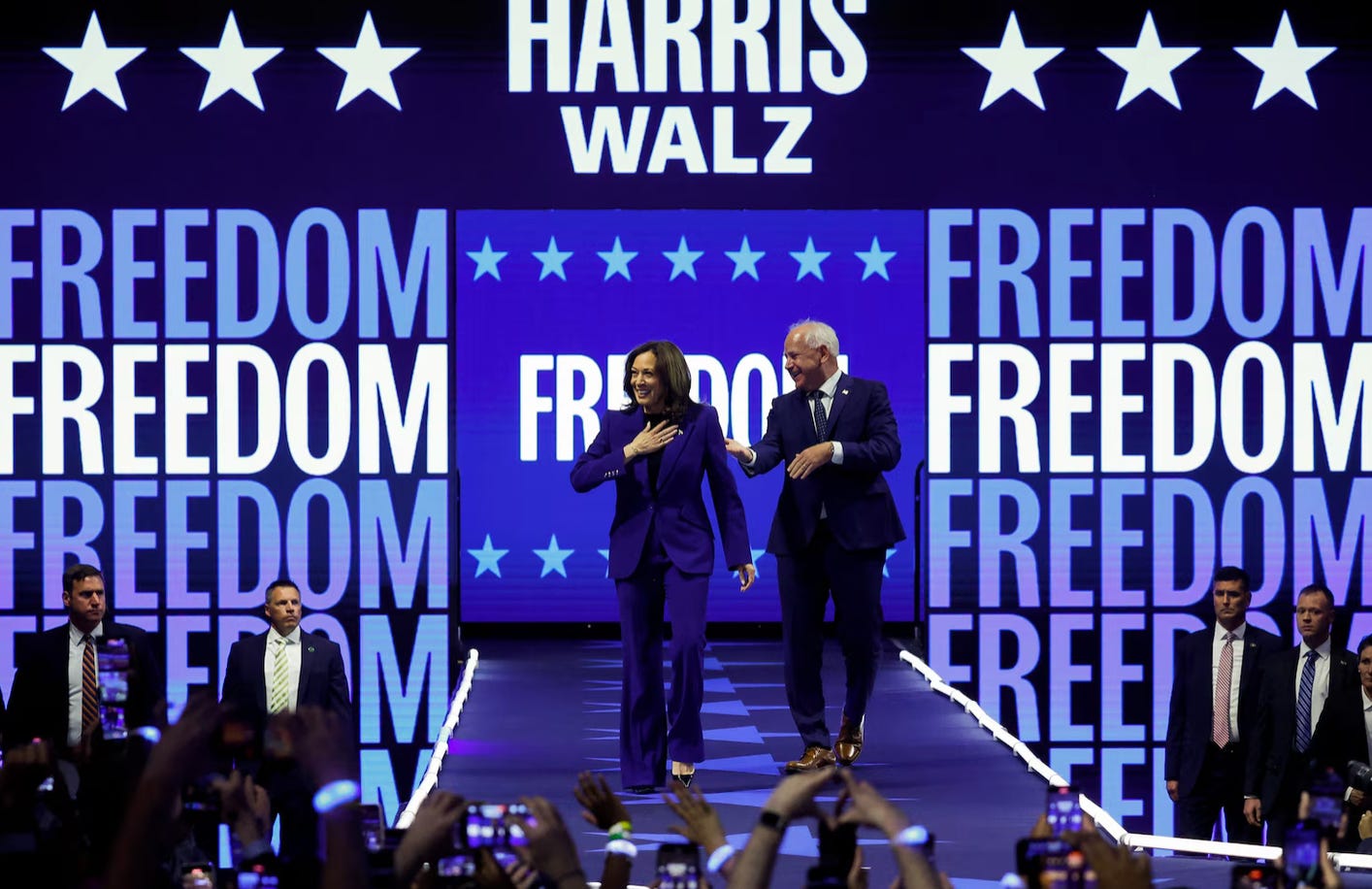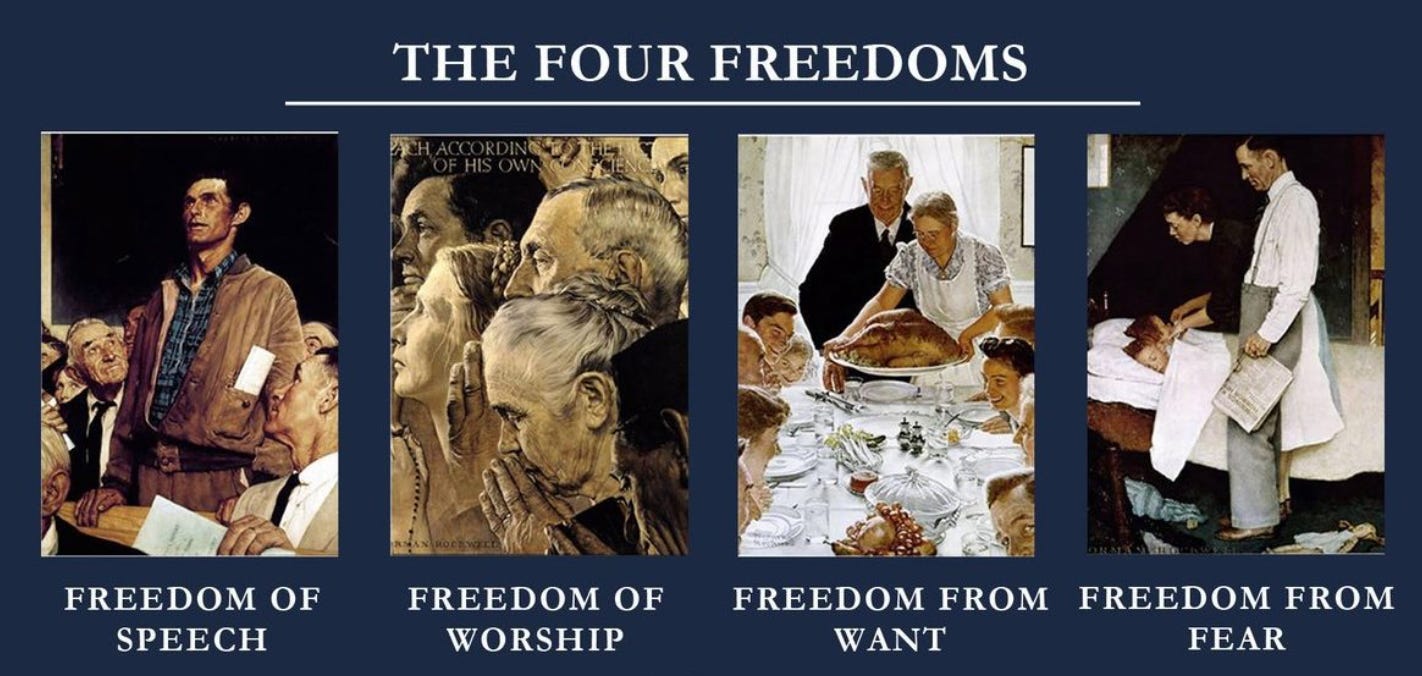The third night of the Democratic National Convention was framed around the theme of “freedom,” a word that has increasingly become a mainstay of the Harris campaign (and not just because it’s great walk up music).
And a night focusing on “freedom” marks the culmination of a subtle but important shift in the Democratic Party as it has transitioned, with stunning smoothness, from the long-planned campaign to re-elect Joe Biden to a hastily-crafted replacement campaign to elect Kamala Harris instead.
If Biden had picked a single word to define his campaign, it would have surely been “democracy,” a theme he kept stressing even as he passed the torch to Harris, framing that move as an important step to “preserve our democracy.” And while Harris still stresses the need to save our democratic institutions from the authoritarian threat of Donald Trump’s MAGA movement, she has chosen to focus more directly on the real stakes here — asking Americans to think not just about the political system they all value, but the values that system protects and what they’ll lose if its opponents get back in power.
“Freedom,” of course, is an elastic term. It can mean many different things to many different people, especially within a diverse nation like the United States.
A framing that’s always stuck with me is one developed by sociologist James Davison Hunter to describe the “culture wars” that emerged in the late 1980s. Hunter argued that the two sides of this political fight were each claiming to defend the American ideals of “freedom” and “justice,” but they had wildly different definitions of what those two terms actually meant.
Where cultural conservatives tend to define freedom economically (as individual economic initiative) and justice socially (as righteous living), cultural progressives tend to define freedom socially (as individual rights) and justice economically (as equity).
When Hunter made that observation in the late 1980s, conservatives and progressives were not just at cross purposes, but a crossroads of sorts. Little more than a decade later, as the culture wars were eclipsed by the “war on terror,” the meaning of freedom in America became warped by wartime propaganda and Democrats largely abandoned their affection for the term.
Just look at the conventions as milestones here:
The 2004 Democratic National Convention stressed a theme of “strength” instead of freedom. One night framed nominee John Kerry’s “Lifetime of Strength and Service,” while the next two nights were organized around themes of “A Stronger More Secure America” and “Stronger at Home, Respected in the World.” Not very subtle.
In 2008, the convention stressed the optimistic Obama themes of “hope and change,” with successive nights dedicated to “Renewing America’s Promise” and “Securing America’s Future,” closed out by the candidate headlining a night on “Change We Can Believe In.”
The 2016 convention, meanwhile, was all about “unity” — with nights themed “United Together,” “Working Together,” and “Stronger Together” — while the 2020 convention likewise stressed the same themes with evenings dedicated to familiar patriotic phrases like “We the People,” “A More Perfect Union,” and “America’s Promise.”
These themes were all … fine? But they were also fairly forgettable. Because they were all, to one degree or another, about branding the Democratic Party as a whole and its presidential nominee in particular as a product that picky voters should choose. Kerry was the new-and-improved Strong Democrat, reporting for duty; Obama the Inspiring Democrat who could lead; Clinton and Biden the Responsible Democrats who could heal.
The decision to focus on “freedom” is altogether different. It puts the focus not on the leader at some distance, but on the individual lives and immediate experiences of the voter. The focus isn’t on them; it’s on us. The question isn’t whether a Democratic candidate will win or lose; it’s what we’ll risk losing if the candidate does.
And so we saw speakers last night lean into the theme of “freedom” to return the Democrats to what James Davison Hunter identified as a long strand of supporting individual rights.
Responding to Republican assaults on abortion rights and reproductive freedom, Oprah Winfrey electrified the crowd by insisting that “the women and men who are battling to keep us from going back to a time of desperation and shame and stone-cold fear, they are the new freedom fighters. And make no mistake: They are the best of America.”
Tim Walz sounded some of the same themes of reproductive freedom in his acceptance speech for the vice-presidential nomination, but he went even further:
[T]his is a big part about what this election is about. Freedom.
When Republicans use the word freedom, they mean that the government should be free to invade your doctor's office. Corporations free to pollute your air and water, and banks free to take advantage of customers.
But when we Democrats talk about freedom, we mean the freedom to make a better life for yourself and the people that you love. Freedom to make your own healthcare decisions and yeah, your kid's freedom to go to school without worrying about being shot dead in the hall.
This is a much more forceful claim to “freedom” than Democrats have made in decades. But it’s not simply a reclamation of the old framing of individual rights that Hunter observed in American political discourse four decades ago. It certainly picks up that claim to freedom, but it doesn’t stop there. It pushes beyond that old point and makes a claim to a liberal interpretation of freedom in an economic sense as well.
For all the conservative claims that they own that term in that sphere — an insistence that economic “freedom” means tax cuts, deregulation, and a blank check to big business — Walz has furthered a case Democrats are making increasingly in recent days, that true economic “freedom” is offered by things like union rights, fair wages, and yes, government protections that shield individual Americans from the whims of billionaires and big business.
In many ways, it signals a return to the framing that FDR famously advanced during the Second World War, when he articulated “The Four Freedoms” that Americans were fighting to defend. Half of his formulation was framed in a way liberals and leftists of recent decades would understand them, as individual rights of the “freedom of speech” and “freedom of worship.” But the other half showed a more expansive understanding, as FDR also spoke of “freedom from want” and “freedom from fear.”
At long last, Democrats are embracing that same capacious definition of freedom, assuring Americans that they have not just an individual right to act as they wish on their own but a collective right to live in a larger society that would protect them from economic and political danger, a promise to ensure that “living freely” isn’t just a theoretical ideal but a practical reality.
It’s a winning message.





